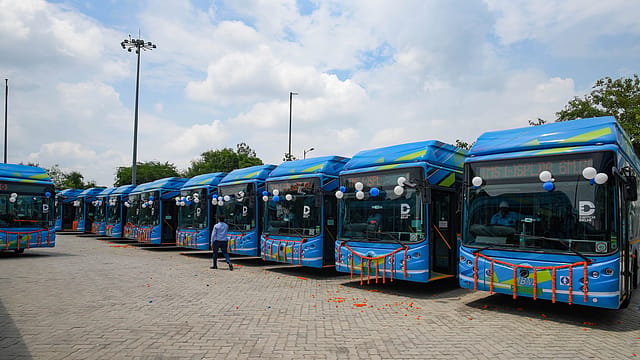Cabinet approves ₹57,613 crore PM e-Bus Sewa scheme
ADVERTISEMENT

The Union Cabinet on Wednesday approved the 'PM e-Bus Sewa' scheme. The bus electrification programme is expected to cost ₹57,613 crore of which ₹20,000 crore will be provided by the central government while states are expected to shell out the rest.
As part of the scheme, 10,000 new e-buses will be deployed in 100 cities to promote green mobility, Union Minister Anurag Thakur said at a press briefing in New Delhi. There are 169 cities in India where the population ranges between 3 lakh and 40 lakh. Of this, 100 cities will be selected based on a challenge method, says Thakur.
"Cities with a population of less than 5 lakh will get 50 buses. Districts with populations ranging between 5 lakh and 20 lakh will get 100 buses. And similarly, 150 buses will be allotted to cities having a population of over 20 lakh but less than 40 lakh," the Union minister says.
Cities that give land to scrap old buses will be allotted extra buses, he says.
The procurement, maintenance and operations of EV buses will be through public-private partnership mode. Central assistance will be provided to run these buses on a per-kilometre basis for the next 10 years. The scheme will be applicable until 2027.
The scheme is expected to generate 45,000-55,000 direct jobs, says Thakur. In hilly states, union territories and in the northeast region, the Centre will contribute 90% of the allocated amount.
Under the Green Urban Mobility Initiative, the Centre plans to make bus rapid transit projects, a national common mobility card, and an intelligent transit management system.
The Cabinet Committee on Economic Affairs, chaired by Prime Minister Narendra Modi, also approved seven projects of the Ministry of Railways with estimated cost of around ₹32,500 crore, with 100% funding from central government. The proposals of multi-tracking will ease operations and reduce congestion, providing the much required infrastructural development on the busiest sections across Indian Railways. These projects aim to increase the existing line capacity, smoothen train operations, reduce congestion and facilitate ease of travelling and transportation. The projects covering 35 districts in nine states - Uttar Pradesh, Bihar, Telangana, Andhra Pradesh, Maharashtra, Gujarat, Odisha, Jharkhand and West Bengal - will increase the existing network of Indian Railways by 2339 kilometres and will provide employment of 7.06 crore man-days to the people of the states.
The Union Cabinet also approved a new central scheme “PM Vishwakarma” with a financial outlay of ₹13,000 crore for a period of five years up to FY28. The scheme aims to strengthen and nurture the family-based practice of traditional skills by artisans and craftspeople working with their hands and tools. The scheme also aims at improving the quality, as well as the reach of products and services of artisans and craftspeople and to ensure that they are integrated with the domestic and global value chains.
Under PM Vishwakarma scheme, artisans and craftspeople will be provided recognition through PM Vishwakarma certificate and ID card, credit support up to ₹1 lakh (First Tranche) and ₹2 lakh (Second Tranche) with a concessional interest rate of 5%.